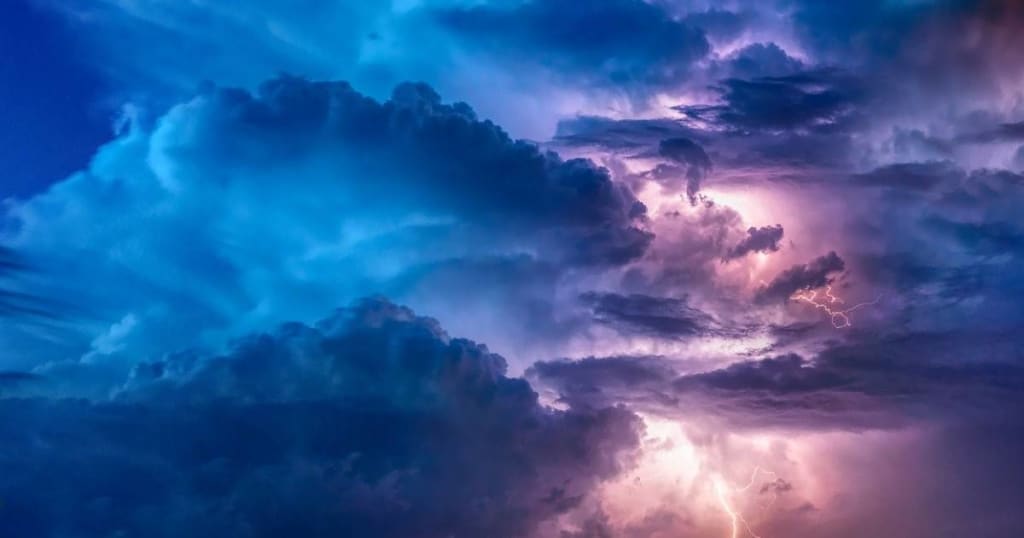
The accumulation of greenhouse gases in the atmosphere traps heat, causing the Earth's surface to warm up, leading to global warming. This warming, in turn, triggers various changes in the climate system, such as melting glaciers, rising sea levels, more frequent and intense heat waves, changes in precipitation patterns, and more severe weather events.
Weather:
Weather, on the other hand, refers to the short-term atmospheric conditions in a specific region. It includes phenomena like temperature, humidity, precipitation, wind speed, and atmospheric pressure. Weather is influenced by numerous factors, including solar radiation, air pressure systems, ocean currents, and local geographical features.
While climate change affects the long-term trends in weather patterns, individual weather events like storms, heatwaves, cold snaps, and droughts are not solely caused by climate change. Instead, climate change can alter the likelihood and intensity of certain weather events.
Relationship between Climate Change and Weather:
Climate change can influence weather patterns over time. For example, it can lead to changes in the frequency and intensity of extreme weather events. Some of the observed effects of climate change on weather include:
Increased frequency and severity of heatwaves: Global warming has resulted in more frequent and intense heat waves in many regions, leading to higher temperatures and prolonged periods of extreme heat.
Changes in precipitation patterns: Climate change can cause shifts in rainfall patterns, leading to increased rainfall in some areas and more prolonged droughts in others. This can contribute to more intense and frequent floods and wildfires.
Intensification of tropical storms: While climate change may not directly cause hurricanes and typhoons, warmer ocean waters and altered atmospheric conditions can enhance their intensity, potentially leading to more destructive storms.
Melting ice and rising sea levels: Climate change has led to the melting of glaciers and polar ice caps, contributing to rising sea levels. This can exacerbate the impacts of coastal storms and increase the risk of flooding in low-lying coastal areas.
It is essential to understand the difference between climate change and weather while studying and addressing environmental issues. Climate change represents long-term trends, while weather refers to short-term fluctuations. Both are interconnected, and studying their relationship is vital for developing strategies to mitigate and adapt to the impacts of a changing climate.
Climate's Impact on Society
Climate and weather changes are of utmost importance due to their wide-ranging impacts on various aspects of our lives and the environment. Here are some key reasons why climate and weather changes are significant:
Human Well-being: Climate and weather conditions directly affect human well-being, health, and safety. Extreme weather events, such as heatwaves, storms, floods, and droughts, can lead to injuries, displacement, and loss of life. Additionally, shifts in climate patterns can impact agricultural productivity, water availability, and food security, which can have severe consequences for communities around the world.
Environmental Balance: Climate and weather changes influence the delicate balance of ecosystems and biodiversity. Alterations in temperature, rainfall patterns, and seasons can disrupt the life cycles of plants and animals, leading to habitat loss, species extinction, and ecological imbalances. These changes can have cascading effects on the overall functioning of ecosystems and the services they provide, such as pollination, soil fertility, and water purification.
Economic Implications: Climate and weather changes can have significant economic implications. Disruptions in agriculture due to shifts in rainfall patterns and temperature extremes can impact food production and result in food price fluctuations. Extreme weather events can damage infrastructure, homes, and businesses, leading to significant financial losses. Furthermore, industries such as tourism, energy, and insurance are also affected by climate variability and weather patterns.
Water Resources: Climate and weather play a crucial role in the distribution and availability of water resources. Changes in precipitation patterns and temperatures influence water supplies, affecting both human consumption and agricultural needs. Alterations in weather conditions can exacerbate water scarcity issues, leading to conflicts over resources and hampering economic development.
Public Health: Climate and weather changes have implications for public health. Rising temperatures can increase the spread of vector-borne diseases like malaria and dengue fever. Extreme heat events can cause heat-related illnesses and even fatalities, particularly among vulnerable populations. Changes in weather patterns can also affect air quality, leading to respiratory issues and worsening allergies.
Global Security: Climate change has the potential to intensify existing social, political, and economic tensions, leading to conflicts and migrations. Competition over scarce resources, such as water and arable land, can exacerbate regional disputes and contribute to geopolitical instability. Additionally, climate-related events, such as sea-level rise and extreme weather, can lead to mass displacements and create refugee crises.
Addressing climate and weather changes requires concerted global efforts to reduce greenhouse gas emissions, promote sustainable practices, and adapt to the changing conditions. By recognizing the importance of these changes, we can work towards mitigating their impacts and creating a more resilient and sustainable future for ourselves and future generations.






Comments
There are no comments for this story
Be the first to respond and start the conversation.